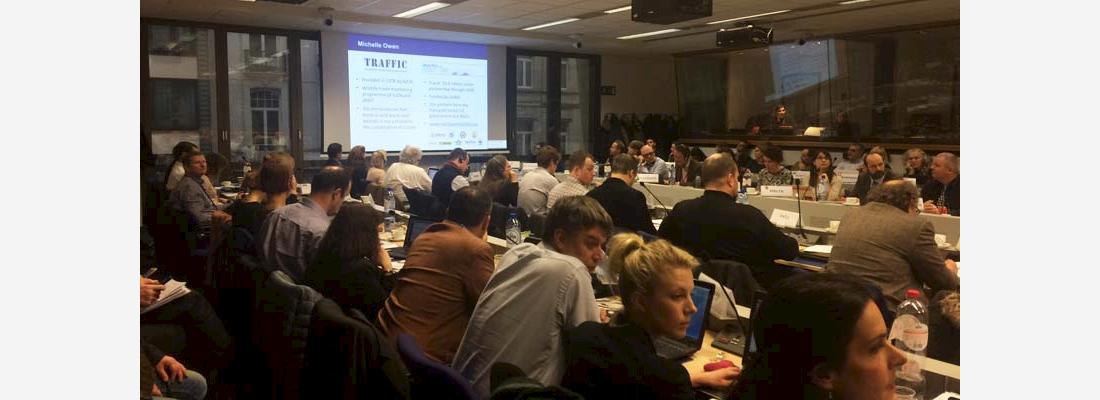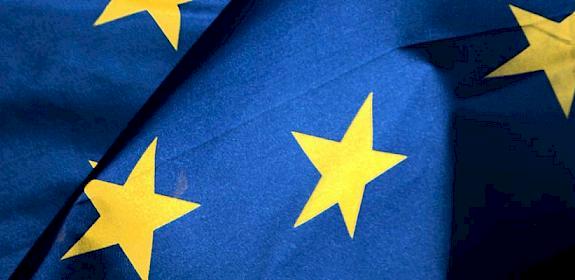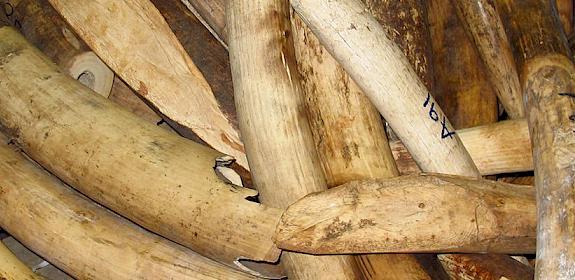EU-Africa collaboration essential for effective implementation of anti-trafficking plan
Brussels, Belgium, 10th February 2017—TRAFFIC is urging the European Union (EU) and its Member States to maximise opportunities to support efforts by African countries to tackle poaching and illegal wildlife trade.
The call came during a meeting held this week attended by representatives from EU Delegations in Africa, Asia and Latin America and hosted by the EU Commission’s Directorate General for International Cooperation and Development (DEVCO) to mark the first anniversary of the publication of the European Union Action Plan against Wildlife Trafficking.
TRAFFIC believes it is critical to promote close consultation and collaboration with range States in Africa to ensure the effective implementation of the Action Plan.
Countries of the African Union have already developed a framework of co-operation in the form of the African Strategy on Combatting Illegal Exploitation and Illegal Trade in Wild Flora and Fauna that was endorsed by the African Union’s Executive Council in June 2015
Sabri Zain, TRAFFIC’s Director of Policy“TRAFFIC hopes the EU Action Plan will fully support effective implementation of that Strategy by the African Union Member States.”
Countries in Africa are also developing region-wide solutions to wildlife crime, with collaborative measures to encourage greater law enforcement co-operation such as the Southern African Development Community Law Enforcement and Anti-Poaching Strategy (SADC LEAP) and PAPECALF [1] the regional law enforcement network aimed at combating poaching established by the Member States of the Central African Forest Commission, COMIFAC.
“African range States have initiated collaborations, identified key problems to address and prioritised their needs. The EU Action Plan can go a long way to helping them meet those needs,” said Zain.
The EU Action Plan also aims to support initiatives to fight corruption associated with wildlife trafficking at national, regional and international levels. Corruption is one of the biggest facilitators of illegal wildlife trade and undermines actions aimed at disrupting the organized criminal networks involved in the trade.
In October last year, a Resolution on the issue of corruption, proposed by the EU, was successfully adopted at the 17th meeting of the Conference of the Parties to the Convention on International Trade in Endangered Species of Wild Fauna and Flora (CITES CoP17).
“Effective implementation of the anti-corruption CITES Resolution is vital and TRAFFIC hopes the EU can fully support CITES Parties through the Action Plan against Wildlife Trafficking,” said Zain.
“For example, tools and guidance can be developed to assist countries in mitigating the risks of corruption in the wildlife sector to provide officials with a practical framework for understanding corruption, why it is a problem for wildlife conservation and help them initiate processes for eliminating it.”
TRAFFIC also encourages the EU to share its best practices in enforcement co-operation with countries in Africa, as suggested in the Action Plan.
For example, for more than a decade, the European Union Trade in Wildlife Information eXchange (EU-TWIX) system has allowed enforcement officers in EU Member States and other European countries to receive accurate, trusted information quickly—which can often make the difference in detecting wildlife crime and stopping the criminals in their tracks. Whilst a similar system, AFRICA-TWIX is currently being trialled in Central Africa with support from the governments of Germany, the USA and WWF.
“The EU should continue to share their experiences with using the TWIX system and the support it is providing to countries in Europe and Africa to help support the fight against wildlife crime,” said Zain.
High level political commitment is also essential in ensuring adequate resourcing and sustained support for Africa’s efforts to curb poaching and illegal trade with strong commitments made to address wildlife crime following the Second Summit Forum on China-Africa Co-operation (FOCAC) attended by the President of the People’s Republic of China, Xi Jinping, and African leaders in 2015.
“TRAFFIC hopes that wildlife crime will also be seen as a priority issue at the High Level Africa-EU Summit expected to take place later this year,” said Zain.
Earlier in the week, the European Commission’s Directorate General Environment organized a separate event focusing on EU internal aspects of the Action Plan, in particular engagement with the business sector, specifically with the exotic pet trade and transport sectors, in line with the actions set out in the Action Plan.
Michelle Owen, lead for USAID’s ROUTES (Reducing Opportunities for Unlawful Transport of Endangered Species) Partnership presented on the actions transport companies are taking, and the opportunities for the European transport sector to build upon their experiences.
Notes:
1 PAPECALF is the French acronym for « Plan d’Action sous régional des Pays de l’Espace COMIFAC pour le renforcement de l’Application des Législations nationales sur la Faune Sauvage »




